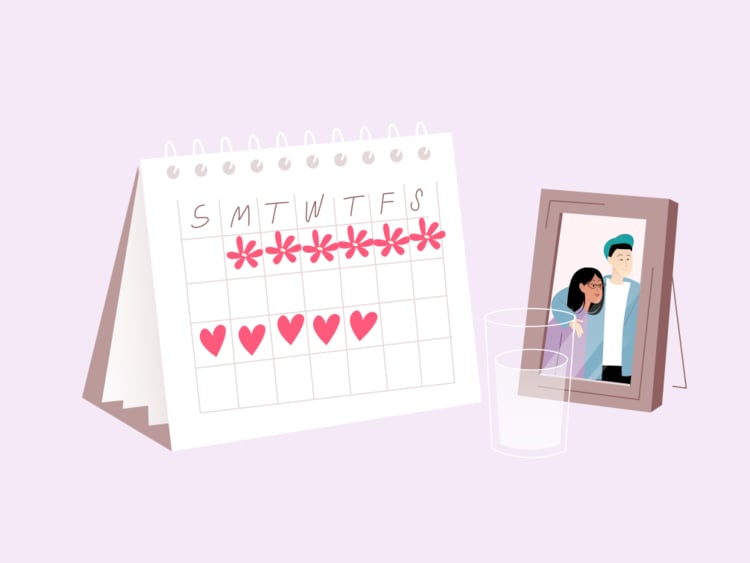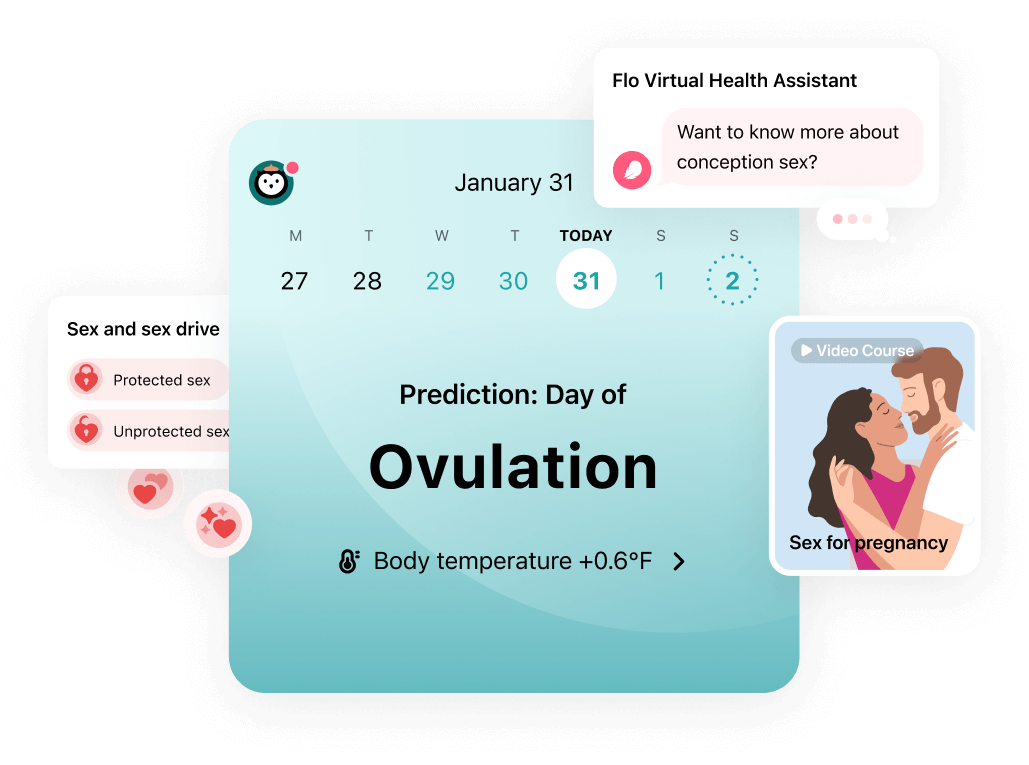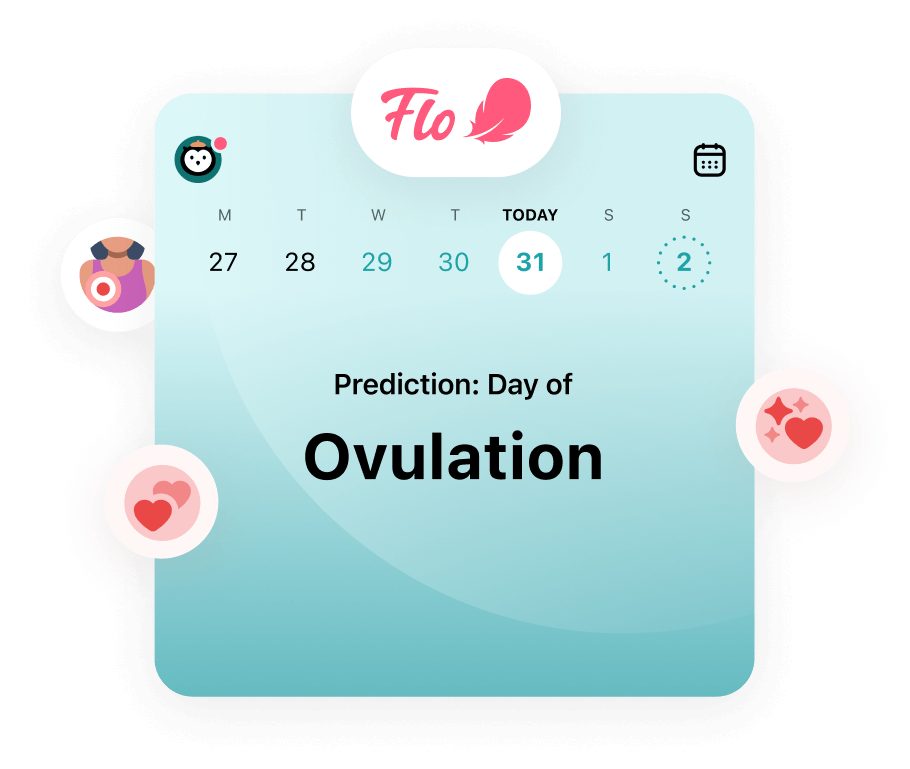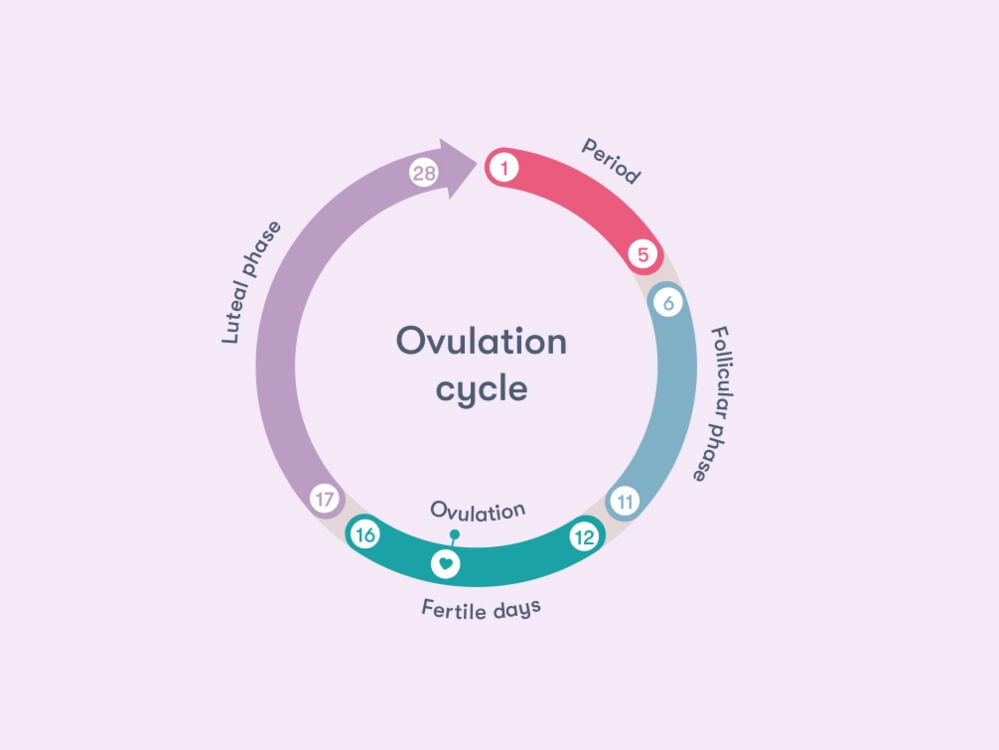A sex schedule doesn’t sound too hot, right? But timing can really impact when you get pregnant. Here, two experts explain what you need to consider if you’re trying to conceive.
-
Tracking cycle
-
Getting pregnant
-
Pregnancy
-
Help Center
-
Flo for Partners
-
Anonymous Mode
-
Flo app reviews
-
Flo Premium New
-
Secret Chats New
-
Symptom Checker New
-
Your cycle
-
Health 360°
-
Getting pregnant
-
Pregnancy
-
Being a mom
-
LGBTQ+
-
Quizzes
-
Ovulation calculator
-
hCG calculator
-
Pregnancy test calculator
-
Menstrual cycle calculator
-
Period calculator
-
Implantation calculator
-
Pregnancy weeks to months calculator
-
Pregnancy due date calculator
-
IVF and FET due date calculator
-
Due date calculator by ultrasound
-
Medical Affairs
-
Science & Research
-
Pass It On Project New
-
Privacy Portal
-
Press Center
-
Flo Accuracy
-
Careers
-
Contact Us
When is the best time to get pregnant during your cycle? Everything you need to know about having sex to conceive


Every piece of content at Flo Health adheres to the highest editorial standards for language, style, and medical accuracy. To learn what we do to deliver the best health and lifestyle insights to you, check out our content review principles.
When it comes to getting pregnant, timing matters. While the movies (and your sex education at school) might suggest that you’d conceive the first time you have sex without using birth control, it can actually be a little bit more difficult. So, when is the best time to get pregnant?
Research has shown that around 85% of couples will conceive within their first year of trying. And if you want to have a baby, you’re probably curious about how to increase your chances of conceiving sooner.
You can do this by better understanding your cycle as a whole — from when your next period is due to when an egg will likely be released for fertilization (also known as ovulation) — by using an app like Flo and getting guidance from your health care provider. Here, two Flo medical board experts explain when the best time to have sex to get pregnant is, how to work out your fertile days, and why a sex schedule might not be the worst idea in the world.

 Over
7.8M
ratings averaging
4.8/5
*
Over
7.8M
ratings averaging
4.8/5
*
Understand your fertility better with the Flo app
- Learn more about your fertility signals.
- Make sense of conception sex with help from our virtual Health Assistant.
- Log when you have unprotected sex (for your eyes only!).
 Over
7.8M
ratings averaging
4.8/5
*
Over
7.8M
ratings averaging
4.8/5
*

Do you want to learn the best time to get pregnant?
The Flo app can teach you all about trying to conceive

 Over
7.8M
ratings averaging
4.8/5
*
Over
7.8M
ratings averaging
4.8/5
*
Understand your fertility better with the Flo app
- Learn more about your fertility signals.
- Make sense of conception sex with help from our virtual Health Assistant.
- Log when you have unprotected sex (for your eyes only!).
When is the best time to try to get pregnant?
Your menstrual cycle describes a series of changes that you’ll experience every month, triggered by the rise and fall of the hormones estrogen and progesterone. It can be split into two phases: the luteal and follicular phases. Their medical names can sound daunting, but they’re pretty easy to understand.
Day one of your menstrual cycle aligns with the first day of your period, and the last day is marked by the start of your next period. The average cycle is 28 days, but if yours is between 21 and 35 days, it’s still considered typical. You can track your period using an app like Flo to find out how long yours is.
Take a quiz
Find out what you can do with our Health Assistant
While there’s no golden day in your cycle when you’re guaranteed to conceive (sadly), there is a period of time known as your fertile window when you’ve got a chance to get pregnant. And the good news? It lasts around seven days. But when exactly is a woman most fertile? To understand the best time to get pregnant, it can be helpful to get into the nitty-gritty of what your hormones are doing before and after your period.
Best time to get pregnant after your period
The first phase of your menstrual cycle is the follicular phase. It starts on the day that your period begins. During your period, your estrogen and progesterone levels are typically low.
Once your period is over, your pituitary gland (a small gland that functions as the hormone control center in your brain) will release follicle-stimulating hormone. This is a hormone that sends signals to your ovaries to start to prepare an egg for release (aka ovulation). Your estrogen levels also begin to rise.
While it’s not impossible, your chances of getting pregnant during this time are pretty low.
Getting pregnant during ovulation
Typically, between days 13 and 15 of your cycle, you’ll experience a surge in luteinizing hormone, which signals one of your ovaries to release an egg. This is called ovulation. It will travel down your uterine tubes, ready for a sperm to fertilize it.
If you’re ready with your calendar wondering when the best time to have sex to get pregnant is, it’s now. Medically speaking, this is the time you’re most likely to conceive.
“The only time during the menstrual cycle to get pregnant is the six to seven days around the time of ovulation, or midcycle for most people,” says Dr. Barbara Levy, clinical professor of obstetrics and gynecology, Washington, DC, US. This is known as your fertile window.
Sperm can live in your reproductive tract for up to five days. At the same time, the egg that the ovaries release into the uterine tube is healthy and viable for around 24 hours after ovulation. So even if you don’t have sex on the day that ovulation occurs, the sperm might still be able to meet and fertilize your egg.
You can work out when your fertile window is using an app like Flo. And while it might not sound like the sexiest thing in the world, it’s recommended that you plan to have sex every day or every other day of your fertile window to maximize your chances of getting pregnant.
Your chances of getting pregnant in your first month of trying are around 30%.
Best time to get pregnant before your period
It’s unlikely that you’d be able to get pregnant right before your next period because your fertile window typically falls around the middle of your cycle.
The days after you’ve ovulated and before your next period begins are called the luteal phase. If you haven’t conceived during your fertile window, then your progesterone levels will slowly start to drop. This can trigger any premenstrual symptoms you experience (e.g., cramps, headaches, and mood changes).
Your estrogen levels will also drop, and this will eventually signal your next period to begin and a new menstrual cycle to start. That’s why you’re less likely to get pregnant right before your period, or during your luteal phase.
If you conceived during your fertile days, however, then your progesterone levels will remain high, creating an ideal environment for the fertilized egg to implant in the uterine lining and thrive.
When is the best time of day to have sex: Morning or night?
So, now that you know the middle of your menstrual cycle is the time you’re most likely to conceive, you might be curious if there’s a best time of the day to have sex to get pregnant. The thing is, it’s difficult to be that specific.
While some studies have suggested that sex in the morning is the best for conception, research is really limited.
How can you tell when you’re in your fertile window?
While you can track your cycle using an app like Flo to see the days that you might be ovulating, there are also some other signs associated with the fertile window that you can look out for. Basically, these are your body’s signals that it’s time to have sex if you want to conceive. They include:
- Clear, sticky vaginal discharge (also called cervical mucus) that looks like raw egg whites
- Discomfort in one side of the belly, called middle pain or mittelschmerz (which is thought to be linked to when an egg is released during ovulation)
- Increased sexual desire
However, Dr. Charlsie Celestine, obstetrician and gynecologist, New Jersey, US, warns that not everyone experiences these symptoms. You might also like to use ovulation tests to get a better idea of whether your ovulation predictions are right. These work by testing your urine for a surge in luteinizing hormone, which occurs around 36 hours before ovulation. Simply pee on the ovulation test stick either once or twice a day in the lead-up to your expected ovulation and wait for a positive result. This tells you that ovulation will occur soon.

How do irregular periods affect pregnancy timing?
Working out your menstrual cycle can feel like you’re juggling mental math. But as your cycle starts when one period begins and ends a day before your next menstruation, a regular menstrual cycle length and regular periods make it easier to identify your fertile window.
However, if you’ve noticed that your cycles fluctuate in length, you don’t need to worry. You can still keep track of them on a calendar or period app. Dr. Levy says, “We call that [pattern] regularly irregular.”
Generally, slight changes in your cycle length aren’t anything to worry about. If you’re having a period more often than every 21 days or aren’t having one for longer than 35 days, then you should reach out to your health care provider. Similarly, if your periods have become much heavier, or if there’s a big difference in your longest menstrual cycle and shortest cycle (20 days or more), then you should speak to a medical professional.
How much time do you need to get pregnant?
Everyone’s experiences of family planning are different, and if it’s taking you longer to conceive than you first thought, then you’re not alone. The Centers for Disease Control and Prevention estimate that around one in five couples experience difficulty conceiving after one year of trying.
Try not to put too much pressure on yourself or your partner at this time. If you’re struggling with the mental weight of trying for a baby, then reach out to your health care provider for support.
You can increase your chances of becoming pregnant by practicing the following tips:
- Keep an eye on your cervical mucus and/or track your cycle so you know ovulation is likely to occur.
- Have sex every day or every other day throughout your cycle. You don’t need to time sex around your fertile window, but doing this may increase your chances of conceiving.
- Try to exercise and eat a balanced diet. Extreme weight loss and gain have been associated with conditions that can impact fertility.
- Try not to drink more than the recommended amount of alcohol. It can impact your chances of conceiving and affect your health during pregnancy.
- Try not to smoke. Smoking can affect your fertility, hormone balance, and reproductive health.
- Try to find lubes that are sperm friendly. Some lubricants can harm the sperm, so when you’re buying a new one, try to find one that’s approved by the US Food and Drug Administration and fertility friendly.
When to see a fertility specialist
“It is a good idea to see your doctor when you are thinking about conceiving to be sure your health is optimal and that any medications you take are OK to continue during early pregnancy,” says Dr. Levy. “Your doctor can help you understand your cycles and get you started on prenatal vitamins.”
Many couples will conceive within the first year of trying, says Dr. Levy. However, because a person’s fertility chances drop as they get older, it’s advisable for women over age 35 to see a doctor if they’ve been trying unsuccessfully for six cycles (or six months) or if their menstrual cycle has become so irregular that they aren’t sure when their fertile time might be.
Dr. Levy advises that you can speak to your health care provider if you’ve experienced:
- A history of pelvic infections
- A previously ruptured appendix (scarring could damage some important parts of your reproductive system like your uterine tubes)
- Conditions that affect fertility, like polycystic ovary syndrome, which can lead to your period becoming irregular or a cycle when you don’t release an egg
- Trying for a baby for longer than 12 months
Anytime you start to feel anxious about becoming pregnant, see a medical professional, Dr. Levy says. “Putting your mind at ease will help your body function best.”
Best time to get pregnant: The takeaway
The best time to get pregnant is during your fertile window, which starts about five days before ovulation and ends the day after.
The idea of timing sex might not sound like the hottest thing in the world, but it can really increase your chances of getting pregnant. And if you’re at all concerned about getting pregnant or understanding when you’re ovulating, you can speak with your health care provider and use an app like Flo to learn more about the best time to get pregnant.


Hey, I'm Anique
I started using Flo app to track my period and ovulation because we wanted to have a baby.


The Flo app helped me learn about my body and spot ovulation signs during our conception journey.


I vividly
remember the day
that we switched
Flo into
Pregnancy Mode — it was
such a special
moment.
Real stories, real results
Learn how the Flo app became an amazing cheerleader for us on our conception journey.
References
“Abnormal Uterine Bleeding.” The American College of Obstetricians and Gynecologists, www.acog.org/womens-health/faqs/abnormal-uterine-bleeding. Accessed 20 Sep. 2022.
“Alcohol Use during Pregnancy.” Centers for Disease Control and Prevention, 11 Jan. 2022, www.cdc.gov/ncbddd/fasd/alcohol-use.html.
“How Smoking Affects Reproductive Health.” U.S. Food and Drug Administration, www.fda.gov/tobacco-products/health-effects-tobacco-use/how-smoking-affects-reproductive-health. Accessed 20 Sep. 2022.
“Fertility Awareness-Based Methods of Family Planning.” The American College of Obstetricians and Gynecologists, www.acog.org/womens-health/faqs/fertility-awareness-based-methods-of-family-planning. Accessed 20 Sep. 2022.
“How to Get Pregnant.” Mayo Clinic, 11 Dec. 2021, www.mayoclinic.org/healthy-lifestyle/getting-pregnant/in-depth/how-to-get-pregnant/art-20047611.
“Infertility.” Centers for Disease Control and Prevention, 3 Mar. 2022, www.cdc.gov/reproductivehealth/infertility/index.htm.
“Irregular Periods.” NHS, www.nhs.uk/conditions/irregular-periods/. Accessed 20 Sep. 2022.
“Mittelschmerz.” Mayo Clinic, 25 Sep. 2020, www.mayoclinic.org/diseases-conditions/mittelschmerz/symptoms-causes/syc-20375122.
Mowat, Alex, et al. “The Effects of Vaginal Lubricants on Sperm Function: An In Vitro Analysis.” Journal of Assisted Reproduction and Genetics, vol. 31, no. 3, Mar. 2014, pp. 333–39.
“Ovulation Signs: When Is Conception Most Likely?” Mayo Clinic, 7 Dec. 2022, www.mayoclinic.org/healthy-lifestyle/getting-pregnant/expert-answers/ovulation-signs/faq-20058000.
Owen, Amy, and Paul B. Sparzak. “Age-Related Fertility Decline.” StatPearls, StatPearls Publishing, 2021.
Pillsworth, Elizabeth G., et al. “Ovulatory Shifts in Female Sexual Desire.” Journal of Sex Research, vol. 41, no. 1, Feb. 2004, pp. 55–65.
“Pituitary Gland.” Cleveland Clinic, my.clevelandclinic.org/health/body/21459-pituitary-gland. Accessed 20 Sep. 2022.
Reed, Beverly G., and Bruce R. Carr. “The Normal Menstrual Cycle and the Control of Ovulation.” Endotext, edited by Kenneth R. Feingold et al., MDText.com, Inc., 2018.
“Session 24: Ovulation and Fecundity.” Human Reproduction, vol. 25, suppl. 1, June 2010, pp. i37–38.
Steiner, Anne Z., et al. “Effect of Vaginal Lubricants on Natural Fertility.” Obstetrics and Gynecology, vol. 120, no. 1, July 2012, pp. 44–51.
Taylor, Alison. “ABC of Subfertility: Extent of the Problem.” BMJ, vol. 327, no. 7412, Aug. 2003, pp. 434–36.
“Weight and Fertility.” ReproductiveFacts.org, www.reproductivefacts.org/news-and-publications/patient-fact-sheets-and-booklets/documents/fact-sheets-and-info-booklets/weight-and-fertility/. Accessed 20 Sep. 2022.
Xie, Min, et al. “Diurnal and Seasonal Changes in Semen Quality of Men in Subfertile Partnerships.” Chronobiology International, vol. 35, no. 10, Sep. 2018, pp. 1375–84.
History of updates
Current version (24 February 2023)
Published (09 November 2018)
In this article

Get your personal guide to fertility
-
Learn how to read your body's ovulation signals
-
Find daily conception tips from our experts
-
Chat with others who are trying to get pregnant




